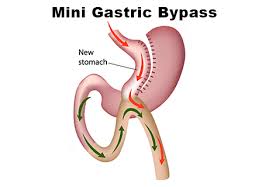
Gastric Bypass Surgery
Gastric bypass surgery is a weight-loss procedure that reduces the size of the stomach and reroutes the small intestine, limiting food intake and nutrient absorption
Gastric Bypass Surgery; Overview
It is highly effective for achieving significant weight loss and improving obesity-related conditions such as diabetes and high blood pressure.


What is Gastric Bypass Surgery?
Gastric bypass surgery, also known as Roux-en-Y gastric bypass, is a well-established bariatric procedure designed to help individuals with severe obesity achieve substantial and sustained weight loss.
Gastric bypass is highly effective at improving or resolving conditions such as:
1. The stomach is divided into a small upper pouch and a larger lower section. 2. The small intestine is rerouted to connect to the smaller stomach pouch.
The surgery involves two key steps:
This process reduces the amount of food the stomach can hold and decreases calorie and nutrient absorption. Gastric bypass surgery is typically performed laparoscopically, which minimizes scarring and accelerates recovery.ic band surgery, no foreign devices are implanted.
Benefits of Gastric Bypass Surgery;
1.Significant Weight Loss:
2. Improvement in Obesity-Related Conditions:
High cholesterol
High blood pressure
Sleep apnea
Type 2 diabetes (often leading to remission)
3.Reduced Appetite:
Changes in gut hormones suppress hunger and improve feelings of fullness.
4.Improved Quality of Life:
Increased mobility, reduced joint pain, and enhanced mental health and self-confidence.
5.Long-Term Results
With proper lifestyle changes, patients can maintain weight loss over the long term.
Disadvantages of Gastric Bypass Surgery;
1. Nutritional Deficiencies:
2. Surgical Risks:
3. Dumping Syndrome:
Rerouting the intestines can reduce absorption of essential nutrients, requiring lifelong vitamin and mineral supplements.
4. Potential Weight Regain
Eating sugary or high-fat foods can cause nausea, diarrhea, and dizziness due to rapid gastric emptying.
While rare, some patients may regain weight if they don’t follow post-surgical dietary and lifestyle guidelines.
Conclusion: Gastric bypass surgery is a powerful tool for combating severe obesity and its associated health risks. While it requires commitment to lifelong dietary and lifestyle changes, it offers life-changing benefits, including sustained weight loss, improved health, and a better quality of life. Consulting with a qualified bariatric surgeon is essential to determine if this surgery is the right choice for you.


Most patients lose 60-80% of their excess body weight within the first 12-18 months after surgery.
As with any major surgery, risks include infection, blood clots, or complications such as leaks at the surgical connection sites.
Istanbul Bariatric
Transform your life with our expert services.
Contacts
© 2024. All rights reserved.
